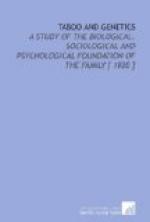The institutionalized forms of social control into which the old sex taboos have developed impose upon all members of the group a uniform type of sexual relationship. These socially enforced standards which govern the sex life are based upon the assumption that men and women conform closely to the masculine and feminine ideals of tradition. The emphasis is much more strongly placed on feminine conformity, however; a great many sexual activities are tolerated in the male that would be unsparingly condemned in the female. Thus the sex problem becomes in large measure a woman’s problem, not only because of her peculiar biological specialization for reproduction, which involves an enormous responsibility but also because her life has for so many generations been hedged in by rigid institutionalized taboos and prohibitions.
The traditional conception of marriage and the family relation implies that all women are adapted to as well as specialized for motherhood. In reality, if the biological evidence of intersexuality be as conclusive as now appears, there are many women who by their very nature are much better adapted to the activities customarily considered as pre-eminently masculine, although they are still specialized for childbearing. There is no statistical evidence of any high correlation between the sexual and maternal impulses. Indeed, a great many traits of human behaviour seem to justify the inference that these two tendencies may often be entirely dissociated in the individual life. Dr Blair Bell (as noted in Part I, Chapter III) believes that it is possible to differentiate women possessing a maternal impulse from those lacking such tendencies by the very anatomical structure. It is obvious that a woman endowed with a strong erotic nature requires a kind of sexual relationship different from one whose interests are predominantly in her children. And both the sexual and maternal types require different situations than the woman who combines the two instincts in her own personality for a normal expression of their emotional life.
According to social tradition, sexual activity (at least in the case of women) is to be exercised primarily for the reproduction of the group. Thus the institutions of marriage and the family in their present form provide only for the woman who possesses both the sexual and maternal cravings. Contraceptive knowledge has enabled a small number of women (which is rapidly growing larger) to fit into these institutions in spite of their lack of a desire for motherhood. There have been a few hardy theorists who have braved convention to the extent of suggesting the deliberate adoption of unmarried motherhood by women who are consumed by the maternal passion but have no strongly erotic nature. Whether their problem will be solved in this manner, only the course of social evolution in the future can show.




